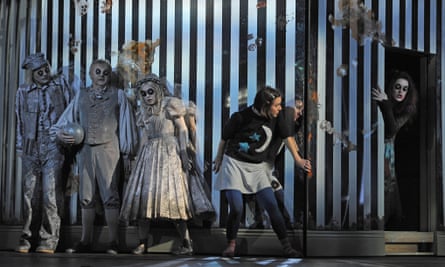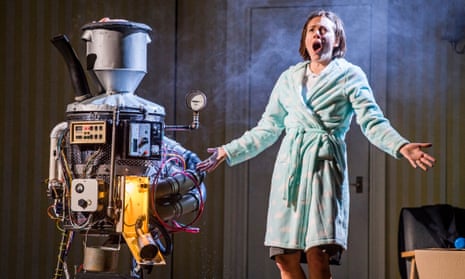Given its world premiere by the Royal Opera at the Barbican, Coraline is Mark-Anthony Turnage’s fourth opera, though it also marks something of a new departure for its composer. It’s his first stage work specifically aimed at a family audience, and consequently avoids the overtly combative or scatological stances of its predecessors.
Its source is Neil Gaiman’s creepy cult novella about a restless 11-year-old, whose exploration of her parents’ new home takes her into a parallel world beyond a bricked-up doorway in her parents’ drawing room. The Other World seemingly offers limitless comfort and enjoyment, but its inhabitants mysteriously have buttons sewn over their eyes, and it soon becomes apparent that the love offered by Coraline’s Other Mother and Father is sinister in its controlling possessiveness. Rory Mullarkey’s libretto deftly condenses Gaiman’s narrative, though he makes some subtle changes: Coraline’s distracted real Father is no longer a writer but an inventor, whose contraptions now play an important part in the opera’s denouement; and we’ve lost both the talking cat, which is Coraline’s companion in both worlds.

Turnage initially simplifies his usually dissonant harmonic palette, though the score is full of his trademark collisions between classical and popular music. There are echoes of Britten in Coraline’s assertions that she will overcome her fears and destroy the Other World’s influence. Waltzes and polkas characterise the thespian downstairs neighbours Miss Spink and Miss Forcible, though their Other World counterparts are allotted a sleazy tango, full of chromatic meanderings and suspensions. As the Other Mother’s true nature is revealed, meanwhile, Turnage’s harmonies turn sour as her vocal line becomes increasingly extravagant and vertiginous. Though the first half has its occasional longueurs, it’s a more coherent score than his previous opera, Anna Nicole, if less immediately striking than Greek, with which he made his name, or The Silver Tassie, which remains his finest stage work.
The Royal Opera have certainly done it proud. The supernatural rubs shoulders with the mundane in Aletta Collins’s production, in which the two worlds are placed back to back as mirror images on a revolving stage. Magic consultants Richard Wiseman and David Britland have been drafted in to provide the special effects, which drew gasps from the audience on occasion on opening night, though Collins also has a knack of suggesting unease by the simplest of means. The scene in which Kitty Whately’s Other Mother produces syringes and surgical needles in an attempt to sew buttons over the eyes of Mary Bevan’s Coraline (“just a little incision under your eyelids”) had me squirming in my seat.
Bevan gives a terrific performance in the title role, assertive, lyrical and superbly acted. Whately is equally commanding in her portrayal of Coraline’s real and other mothers. Alexander Robin Baker makes a perfect, and at times touchingly sympathetic foil, as the two fathers, while Gillian Keith and Frances McCafferty camp it up something rotten as misses Spink and Forcible. Sian Edwards, meanwhile, conducts the Britten Sinfonia with considerable panache. Turnage has long divided opinion, and not everyone, I suspect, will like it. But the children in the audience enjoyed it hugely, and if it brings new listeners to opera itself, then it has more than served its intended purpose.

Comments (…)
Sign in or create your Guardian account to join the discussion